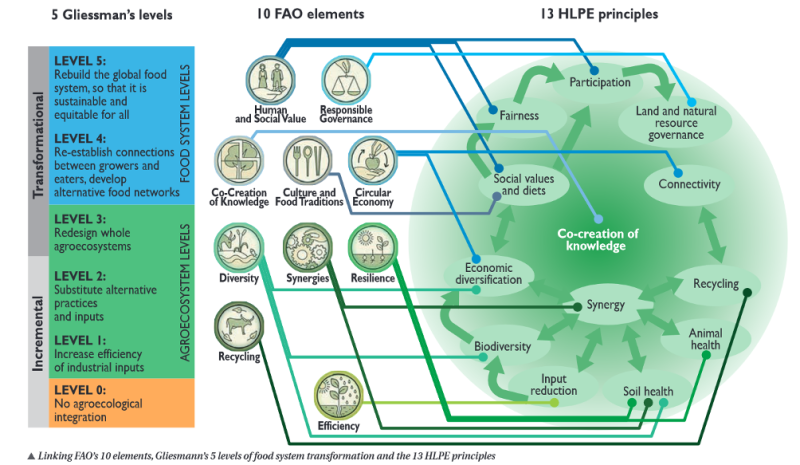The diversity of agriculture and food systems on this planet heralds the way to a variety of agroecological transition pathways (different baselines, input usage levels, socioeconomic contexts an particularly different labor costs and availability in agriculture, different value chain arrangements, levels of connection between farmers and consumers, and consumer preferences in food systems), and also diversity in terms of public action needed (subsidy levels that could be reoriented to incentivize change, implementation of policies from different sectors, research and extension, etc.).
However, there are also communalities in terms of understanding the biology, ecology and socioeconomics of farming agroecosystems and their functioning, and how to manage risks, including those triggered by climate change, how they contribute to food system functioning.
These transformations need to be closely tuned to the initial contexts, which vary considerably between regions and countries. Agroecological transformation cannot be a ‘one size fits all’ endeavor. Indeed, in some parts of the world where inorganic input and pesticide use is generally low and sometimes non-existent, and where available water is in very short supply, the priority is often focused on increasing access and usage of these inputs to boost production and productivity. Agroecology is relevant, even under these conditions, and can provide solutions while minimizing environmental impacts. Any decisions to increase such input use must strive to strike a balance between short-term productivity gains and longer-term resilience, environmental health and sustainability gains. The linkage between sustainable intensification and agroecological transformation emerges here as a point of analysis.
These issues have led researchers from CGIAR and French research organizations to work together in compiling this Dossier to showcase their expertise and research advances at the disposal of other researchers, policymakers, extension services, NGOs and farmers’ associations committed to promoting the agroecological transition. This transition process requires commitment to explore and support new ways of conducting research based on systemic and transdisciplinary approaches, implementing inclusive participatory methods, the solution-based theory of change, fostering partnerships with national agricultural research systems, while enhancing orchestration of research, policy and investment efforts to converge towards sustainable and resilient food systems!

| Year of publication | |
| Publisher | CGIAR |
| Geographic coverage | Global |
| Originally published | 01 Oct 2021 |
| Knowledge service | Metadata | Global Food and Nutrition Security | AgroecologySustainable Food Systems | Agricultural inputsAgroforestryAgroecological practiceFood system |
| Digital Europa Thesaurus (DET) | ecosystem servicesvalue chainMarketnutritioninnovationresearchknowledge transfer and exchangedigital technology |
